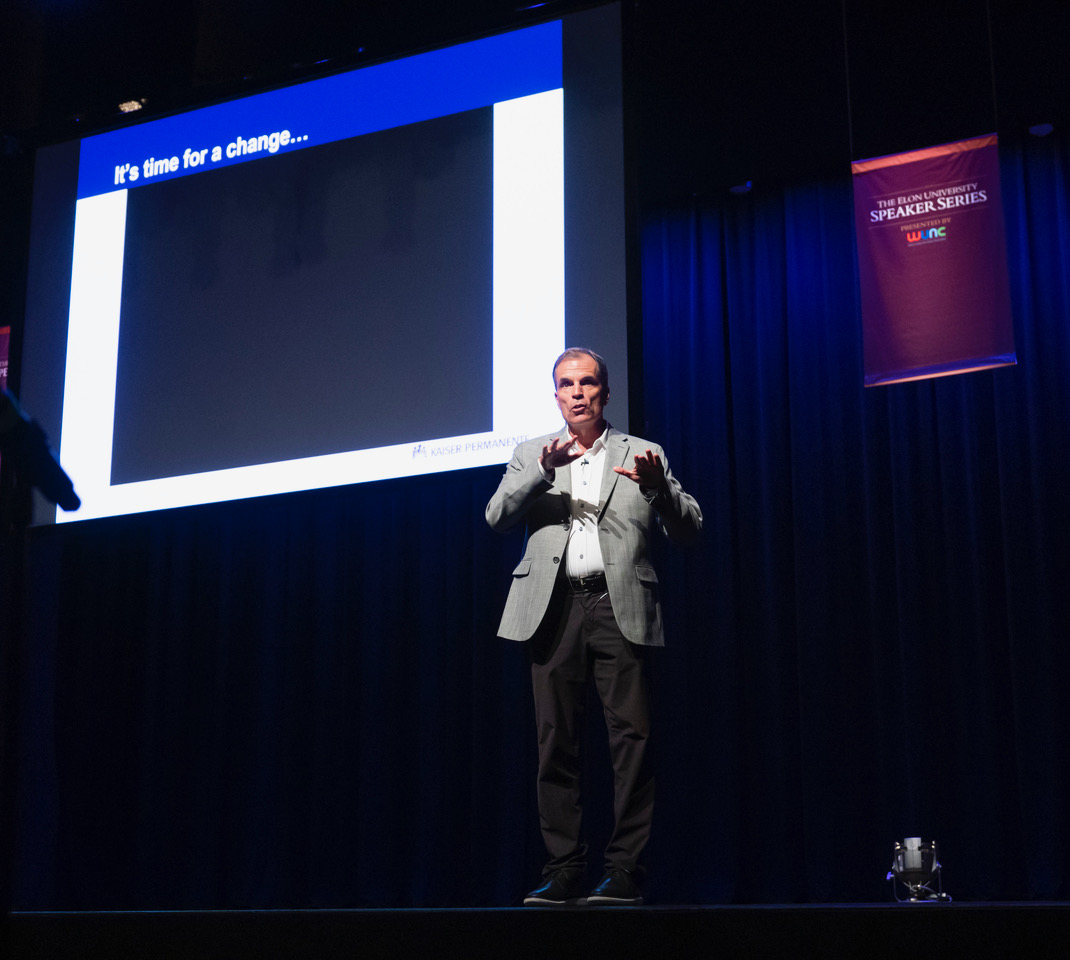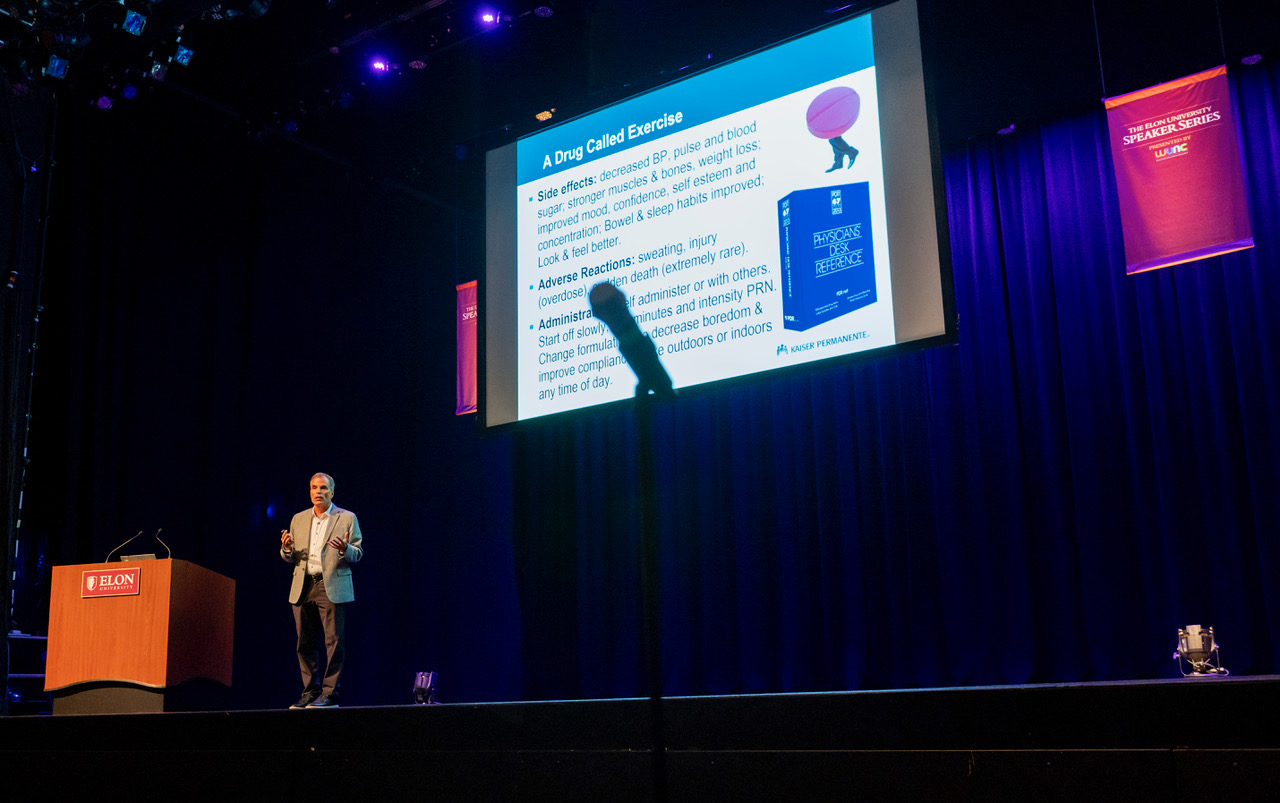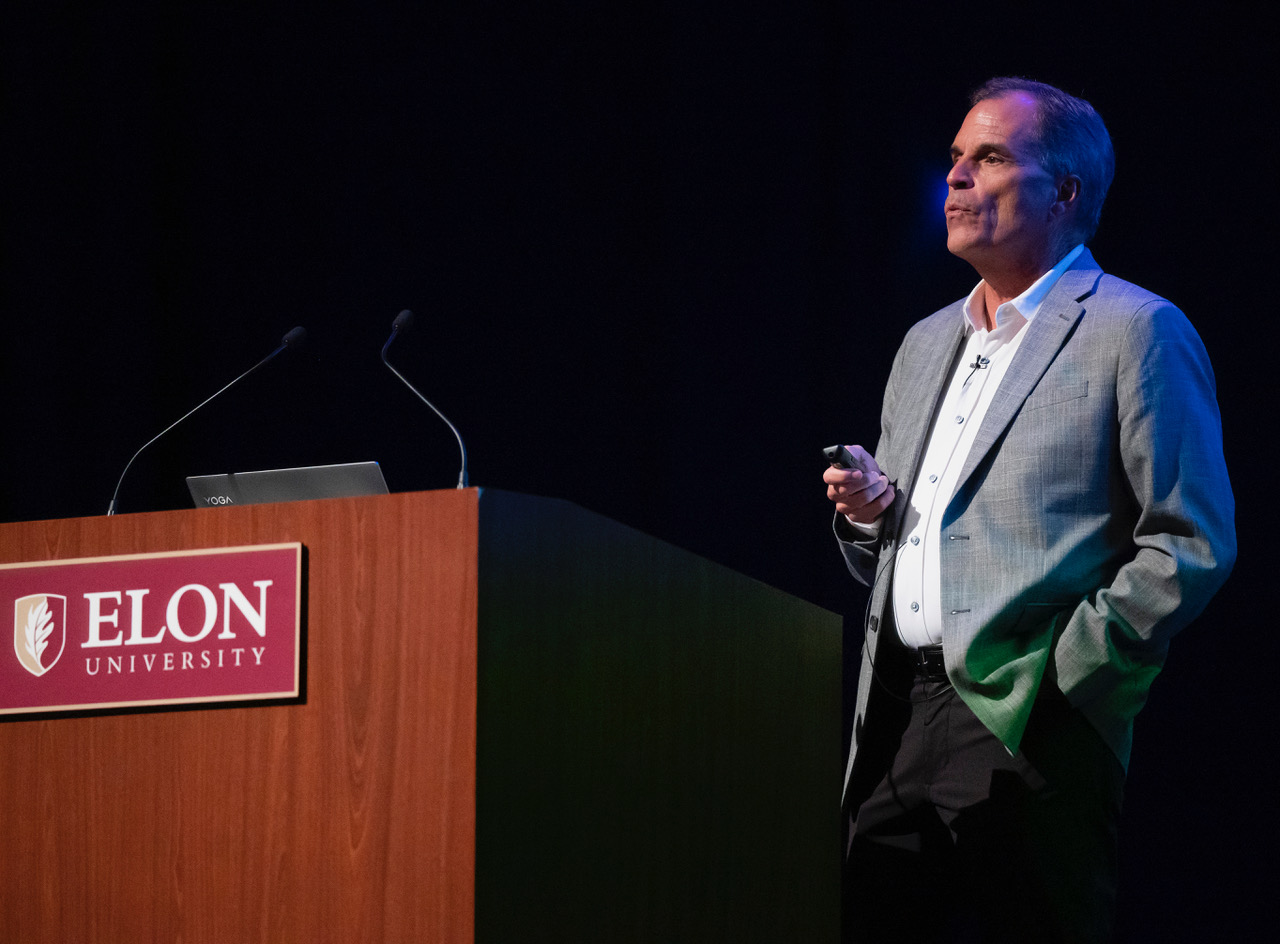Sallis spoke on the benefits of exercise during the first event of the university's 2022-23 Speaker Series in McCrary Theatre on Monday, Sept. 12.
Dr. Robert Sallis started the first event of the 2022-23 Elon University Speaker Series, which has the theme of “Living Well in a Changing World,” by highlighting the benefits of an off-label and unapproved drug that drastically outweigh its adverse effects. That drug, Sallis said, is exercise.
“Studies show us that there is a linear relationship between one’s minutes per week of physical activity and the health status they enjoy. That is those who maintain an active and fit way of life live longer, healthier lives while those who are sedentary and unfit very predictably begin to suffer prematurely from chronic diseases and die at a younger age,” he said to those in McCrary Theatre on Monday, Sept. 12. “You just can’t argue with the evidence.”
Although referring to exercise as a “drug” in a touch-in-cheek manner, there is nothing exaggerated about how helpful exercise can be. Sallis, a practicing family medicine physician and team doctor for the Los Angeles Football Club, is also currently the chairman of the Exercise is Medicine Advisory Board. Exercise is Medicine, started in 2007 by the American College of Sports Medicine and the American Medical Association, is currently in 37 countries and on 284 college campuses.

Sallis was the president of the American College of Sports Medicine at the time and said Exercise is Medicine strives to make physical activity assessment and exercise prescription a standard part of the disease prevention and treatment paradigm for all patients.
One of the first steps Sallis and Exercise in Medicine have advocated for is a worldwide initiative for every patient to be given a treatment plan that involves exercise, physical activity to be recorded as a vital sign and for there to be consistent messaging regardless of specialty.
The ultimate goal, which Sallis believes would be the ideal outcome, is to merge the fitness and health care industries. A symbiotic relationship between the two realms is what could make a serious change.
“Health care providers have an obligation to assess each patient’s exercise habits and make a proper exercise prescription. In a similar fashion, we’ve got to get fitness professionals and gyms behind the message. We’ve got to get people who need their help in the gym. Not just the ones who want to look good but the ones who want to get healthy,” Sallis said.
Sallis mentioned two examples of how exercise proved to be equally, or more, beneficial than pharmaceuticals. The first was the story of Augie Nieto, a pioneer in the fitness industry and founder of Life Fitness. In 2005, Nieto was diagnosed with ALS, which had rapidly progressed.
After a period of severe depression and dissociation, Nieto was convinced to get into the gym again and found that his mood and condition greatly improved. He was re-energized on his work and started “Augie’s Quest,” a foundation focusing on finding a cure for ALS.
The second was at his local health club where Sallis enrolled 13 Parkinson’s patients in a 12-week trial. Sallis was inspired by a video of a man with end-stage Parkinson’s disease who could barely walk in a straight line due to severe tremors but could ride a bike flawlessly.
Sallis had the 13 patients with moderate level Parkinson’s disease enroll in a spin class and maintain an RPM of 85. At the end of the 12 weeks, the patients showed a 37% improvement on the UPDR scale, which evaluates various aspects of Parkinson’s disease. Compared to patients over a 12-week period who only used Levodopa, the standard Parkinson’s drug, exercise proved to be a more effective treatment.

“Clearly, this works better than the medicine we use. Why does the medical community neglect physical activity as a treatment,” Sallis asked.
The reason for this, Sallis said, is physicians feel it’s easier to write a prescription and patients expect this. But in looking at the data, Sallis feels that physical activity is “the most accurate predictor of a person’s health and longevity.”
Sallis also spoke on the role universities can play in helping students develop lifelong plans for fitness. The “freshman 15” is a well-known trend of freshmen gaining weight during their first year at college. Although studies show that the gain on average is only 6 pounds in men and 4.5 pounds in women, Sallis said it’s still a serious issue.
“Kids have a card that allows them to eat all they can eat and, oftentimes, less than healthy food. You stress them out, they don’t sleep well and there’s opportunities to experiment with drugs and alcohol,” Sallis said. “[If universities] were a foster parent, [they] might be brought up on charges of child neglect or even child abuse.”
Universities have a responsibility to their students to make sure they leave as healthier people than when they arrived and Sallis recommends that there be mandatory physical education classes and an emphasis placed on creating more social events revolving around fitness.
“I hope you’ll be out there to be an agent for that change at Elon University. You’ve got great facilities here and great opportunities to help students live a long and healthier life,” Sallis said.
Monday’s event was also the first in the annual Voices of Discovery Series, an initiative of Elon College, the College of Arts and Sciences, that seeks to bring preeminent mathematicians and scientists to campus.



